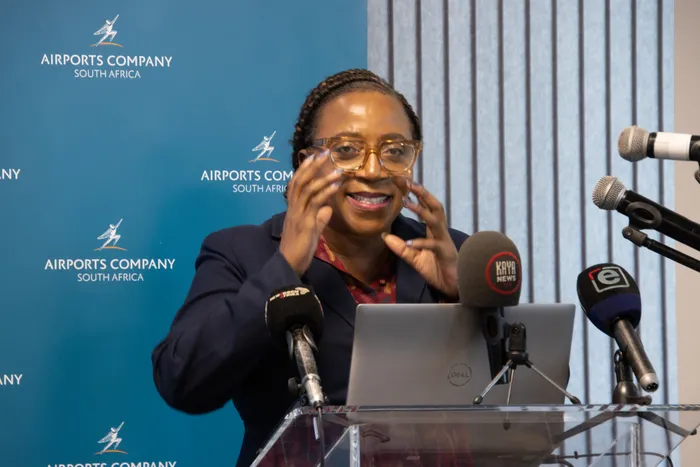Resilient leadership: How South Africa's leaders are driving renewal

Mpumi Mpofu, CEO of Acsa.
Image: File.
South Africa is a nation that knows both endurance and despair. The economy limps along at 0.6 percent growth, unemployment traps more than 32 percent of the labour force and infrastructure strains continue to test confidence. Against this backdrop, it is easy to assume that competence is absent and that leadership has collapsed into permanent decline. And yet, beneath the headlines of failure, there are pockets of renewal.
Quietly, and often under immense pressure, a generation of leaders across state-owned enterprises, corporates and new ventures have demonstrated that South Africa is not short of excellence. These stories do not erase wider challenges, nor are they immune to fragility. But they show that discipline and consistency can deliver measurable turnarounds even in the hardest conditions.
Few expected Airports Company South Africa (Acsa) to recover quickly from the double blow of Covid-19 and collapsing aviation revenues. Yet under CEO Mpumi Mpofu, the company posted a R1.1 billion profit in 2024/25, grew revenue by 13 percent to R7.9 billion and set out an ambitious R21.7 billion investment plan to upgrade terminals and runways. This is more than balance-sheet repair: it is about restoring airports as engines of tourism, trade and national credibility.
If any job symbolises inherited crisis, it is the helm of Eskom. The utility has long been synonymous with operational strain and decades of difficulty. Dan Marokane’s tenure has not ended load-shedding, but it has stabilised operations and begun to reposition Eskom towards innovation, most visibly through the 100 MWh Battery Energy Storage System, a first for the utility. Progress remains vulnerable, but it shows that with consistency, even institutions weighed down by history can begin to shift direction.
Energy giant Sasol faced pressure from every direction: carbon transition debates, volatile oil markets and sceptical investors. In 2024, under Simon Baloyi, the company delivered a R6.8 billion profit turnaround and saw its share price rise by 39 percent. His approach has been to balance profitability with sustainability, investing in cleaner processes while protecting Sasol’s central role in South Africa’s industrial economy. Critics may argue such turnarounds are temporary, but they nonetheless show how steady leadership can hold ground in volatile sectors.
Standard Bank, under Sim Tshabalala, has grown into a $21.6 billion market giant with operations across the continent. It is proof that a South African-headquartered institution can compete globally while deepening African financial integration. Some will say banks benefit from favourable conditions more than leadership, yet the consistency of growth under Tshabalala underscores the role of vision and execution in sustaining credibility.
In renewable energy, H1 Capital has committed to powering more than two million households through its investments. As one of the largest locally owned players in the sector, it shows that capital, when deployed inclusively, can accelerate both equity and sustainability. Success in renewables is highly dependent on policy and infrastructure, but the scale of ambition reflects a capacity for private capital to play a catalytic role in South Africa’s future. These examples highlight the endurance of leaders who have steered institutions through demanding circumstances. Their achievements deserve far greater recognition for the stability and momentum they create. They also show that leadership strength emerges across sectors and backgrounds, forming part of a broader national fabric.
At the helm of Africa’s largest retailer, Pieter Engelbrecht has navigated inflation, supply disruptions and fragile consumer demand. In FY2024, Shoprite reported revenues of R240.7 billion, growing sales by 16.9 per cent. Its Checkers Sixty60 platform has become South Africa’s largest online grocery service with more than 100 000 daily orders. In a country where household budgets are stretched thin, retail stability is not abstract: it is felt in the ability of families to access affordable goods.
Discovery’s Vitality model is perhaps South Africa’s most globally exported innovation, present in more than 40 countries. Under Adrian Gore, the company turned the heavy claims environment of Covid into an opportunity to expand into integrated banking and health products. Revenues rebounded to R94 billion in 2024. Discovery’s trajectory shows how South African ingenuity can set international benchmarks. While global expansion brings risks, it also demonstrates that competitiveness is possible well beyond domestic markets.
FirstRand adds another dimension. Outgoing CEO Alan Pullinger leaves behind a bank with earnings of R54 billion in 2024. His successor, Mary Vilakazi, is one of the first women to lead a major financial institution in the country. This transition embodies inclusive renewal, the blending of continuity with transformation. Alongside Sim Tshabalala at Standard Bank, it signals that South Africa’s financial sector is not only stable but actively reshaping leadership demographics at the highest level. That many of these turnarounds have been led by figures who embody South Africa’s broader transformation adds further significance, showing how inclusion and competence can reinforce each other.
These successes remain vulnerable to external shocks and systemic pressures. Acsa must manage fuel supply risks; Eskom’s stabilisation is still at an early stage; Sasol is exposed to energy volatility; Shoprite faces consumer pressure; Discovery must adapt to regulation; and renewable investors like H1 Capital depend on grid capacity. None of these achievements are without their own conditions and vulnerabilities. Yet their very emergence under such conditions is what makes them instructive. They demonstrate that leadership matters: steady hands can deliver results even in environments where volatility and uncertainty are the norm.
The lesson is not that South Africa has been fixed, but that there is capacity worth nurturing and multiplying. These stories, across industries and backgrounds, public and private, share one theme: consistency under pressure. They reveal that South Africa has leadership depth, scattered across sectors, often unacknowledged and frequently uncelebrated. They also remind us that leadership is not about grand gestures but about discipline, steadiness and vision applied over time.
Nelson Mandela once compared a leader to a shepherd: “He stays behind the flock, letting the most nimble go out ahead, whereupon the others follow, not realising that all along they are being directed from behind.” This metaphor captures what many of these leaders have done, guiding institutions back from weakness not by dominating headlines but by enabling recovery quietly, persistently and from within.
The question, then, is not whether South Africa has the leaders it needs. It clearly does. The question is whether society can recognise, support and multiply their successes. If Acsa’s recovery boosts tourism, Eskom’s storage system strengthens supply, Sasol balances transition, Shoprite anchors retail stability, Discovery exports innovation and banks like Standard Bank and FirstRand continue to channel capital into growth, then national renewal is not an abstraction. It is already happening in fragments. What remains is to turn fragments into a pattern.
South Africa does not lack leaders; it lacks the systems and culture to elevate them. Recognition matters because morale matters. Confidence can only be rebuilt if citizens believe that competence exists and that excellence is not the exception. South Africa is a country weary of promises, plans and blueprints. But perhaps the soul of its future will not be revived by another grand design. It will be revived by recognising the brilliance already at work, often hidden in plain sight. From airports to banks, from energy to retail, leaders across the spectrum are showing that endurance and excellence are possible. They remind us that decline is not inevitable, and that excellence, when multiplied, can restore both trust and growth. The choice now lies with us: to let these stories remain isolated, or to make them the foundation of South Africa’s renewal.

Nomvula Zeldah Mabuza is a Risk Governance and Compliance Specialist with extensive experience in strategic risk and industrial operations. She holds a Diploma in Business Management (Accounting) from Brunel University, UK, and is an MBA candidate at Henley Business School, South Africa.
Image: Supplied
Nomvula Zeldah Mabuza is a Risk Governance and Compliance Specialist with extensive experience in strategic risk and industrial operations. She holds a Diploma in Business Management (Accounting) from Brunel University, UK, and is an MBA candidate at Henley Business School, South Africa.
*** The views expressed here do not necessarily represent those of Independent Media or IOL.
BUSINESS REPORT